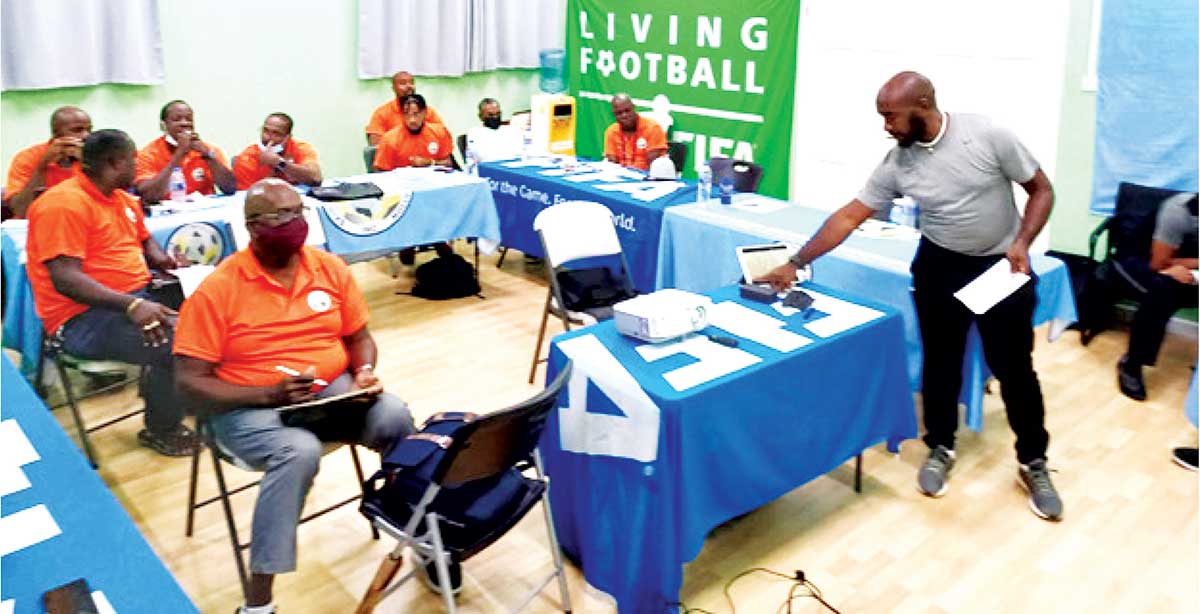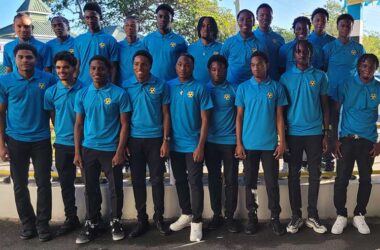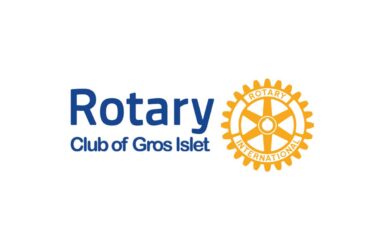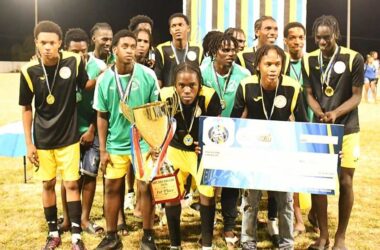Driven by a relentless effort geared to up its game – local football officials continue to push ahead for an opportunity to compete on soccer’s biggest stage –the FIFA World Cup.
As part of the process in pursuit of this quest, the St Lucia Football Association [SLFA] Inc. has been undertaking a series of certification courses in a bid to enable more local coaches to attain professional standards.

At last Saturday’s opening session for the C’ License coaching course, FIFA’s Technical Development Officer, Lenny Lake, instilled in the participants the value of ‘Coaching Education’. He highlighted the necessity of this component as a requisite factor to get both coaches and players to better understand the game.
Lake recalled that over the years, he has held discussions with the SLFA president Lyndon Cooper who “has a really strong vision for football development, here,” and aspirations to compete at a World Cup.
“But that should not be his message alone…that should be the message of every player, coach, club and whoever is involved in football,” he said. “Many years ago, I thought this was not possible but today I can simply say it’s possible for countries that we consider small to reach the World Cup.”
Noting that CONCACAF is the only one of the six federations under the FIFA umbrella body to have not embarked on a ‘Coaching Convention’, he said plans are currently underway to advance this agenda.
While informing participants that a convention is “a set of guidelines to standardize coaching”, Lake acknowledged the input of CONCACAF for embarking on this latest initiative. “They (Concacaf) not only decided to have a convention but went to UEFA and said to them that you have to help us with this,” he explained.
“This CONCACAF convention on coaching education is being mentored by some of the best minds in UEFA. Because …some way down the road we are going to see the equivalency or some importance to what we’re doing,” he added.
Lake told the participants that acquiring the C’ License certification is one step along the journey to achieve the higher licensing standards.
Lake disclosed that Saint Lucia is now a member of the coaching convention of CONCACAF “where you can do C, B, and A (courses) but your license will not be recognised. Now to get there, you need this …you need to have courses like this being done by your coach educators. Because you need to have your coaching education development program and not rely on CONCACAF.”
However, he said, CONCACAF has provided “a seed of approval that whatever you’re doing is in keeping with the standard of the convention that is global.”
Lake implored participants that their motive should not be focused on acquiring monetary gains, but to ‘develop the best players’ and devote their energy and passion “to get the next player or players to the top level.”
The SLFA president insisted that “the dream of going to a World Cup” is not solely his goal, “but it is part of the SLFA’s track plan, which was unveiled to all persons that are part of the consultations.”
Speaking on the importance of the coaching education program, Cooper reiterated that his primary objective as the SLFA boss is “to articulate and advance the policies and objectives (of the SLFA)…and it is my responsibility to ensure that those policies are executed.”
However, Cooper added: “The challenge for the SLFA is that while the investments remain huge, the reality is the challenge to do an evaluation from the investments and compare it with the end result on the field.”
He said over the past four to five years, the SLFA has had to rethink its strategies every year “and to make the necessary adjustments that may facilitate the growth or the understanding of football.”
Said Cooper: “For us, the challenge is not something that is beyond our reach. Once we begin as an association, as coaches, as experts to show an understanding of what the plan is, then we are satisfied at the SLFA that the objectives are going to be met over a shorter period of time.”
The SLFA boss declared that “while the investments are forthcoming, the results, most of the time, come not at the rate of the investment.”
Consequently, he said, the SLFA decided to take a second look at the coaching education program and to re-introduce a certification course.
He further disclosed that by mid-year, the D’ License certification will no longer be valid; and coaches will need to have attained a C’ License grade to qualify as part of the technical staff to participate in the SLFA’s Div. I and II Championships, to manage teams both at the club level and the inter-district level.
Additionally, said Cooper, a B’ License certification course will be initiated later this year as part of the SLFA’s long-term developmental plan.
He asserted: “We share the view …that we have enough competent and educated persons in our midst that can assist the SLFA to meet its overall objectives when it comes to coaching.”



![MSS takes on VPSS in an action thriller [Photo credit: MYDS]](https://thevoiceslu.com/wp-content/uploads/2026/02/MSS-takes-on-VPSS-in-an-action-thriller-feat-380x250.jpg)
![Tapon House recorded its fourth consecutive title victory [Photo credit: MYDS]](https://thevoiceslu.com/wp-content/uploads/2026/02/Tapon-House-recorded-its-fourth-consecutive-title-victory-380x250.jpg)

![Julien Alfred, left, edges Jacious Spears to win the women’s 60 metres at the Tyson Invitational in Arkansas, USA on Friday [Photo credit: CMC]](https://thevoiceslu.com/wp-content/uploads/2026/02/Julien-alfred-1-380x250.jpg)
![Denver Alphonse Jr. [Photo Credit: ASC KCS]](https://thevoiceslu.com/wp-content/uploads/2026/02/Denver-Alphonse-Jr-feat-380x250.jpg)
![On field action in the Bay Bay Cup [Photo credit : MYDS]](https://thevoiceslu.com/wp-content/uploads/2026/02/On-field-action-in-the-Bay-Bay-Cup-feat-380x250.jpg)



![VFCSS takes on BCSS in on court action at the BIF [Photo credit : MYDS]](https://thevoiceslu.com/wp-content/uploads/2026/02/VFCSS-takes-on-BCSS-380x250.jpg)
